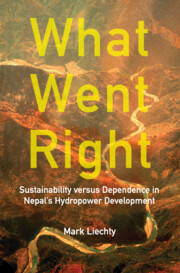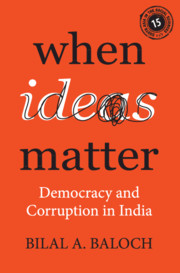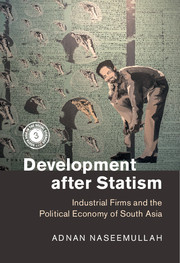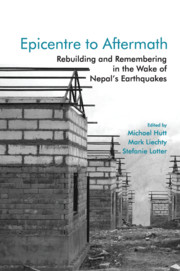
What Went Right
Sustainability Versus Dependence in Nepal's Hydropower Development
- Author: Mark Liechty, University of Illinois, Chicago
- Publication planned for: October 2024
- availability: Not yet published - available from October 2024
- format: Paperback
- isbn: 9781009088961
Paperback
Other available formats:
Hardback, eBook
Looking for an inspection copy?
Please email [email protected] to enquire about an inspection copy of this book
-
This book explores why Nepal's hydropower sector is one of its few development success stories. Unlike most other 'developing' countries, in Nepal local firms design and build hydropower facilities using Nepali engineers, builders and labor. Nepal has largely avoided the trap whereby most poor countries are forced to accept energy infrastructure projects that are foreign designed, funded and built – typically resulting in debt, dependency and unsustainability. It traces the struggle between two competing development paradigms: one that emphasizes gradual national human capacity building – at the expense of speed and efficiency – and another that emphasizes rapid, large-scale infrastructure building – at the risk of unsustainability and dependency. At stake is whether what passes for 'development' benefits the countries in which it occurs, or the banks and investors that finance capital-intensive projects. What Went Right brings a vision for sustainable development into vigorous conversation with development strategies that have proven to be less productive.
Read more- Brings a vision for sustainable development into vigorous conversation
- Provides pros and cons of the dominant development paradigms by offering a detailed account of an alternative approach
- Analytically addresses both the engineering and social dimensions
Reviews & endorsements
'This book tells a remarkable story of the growth of local hydro power development in Nepal. It formally starts in 1963 with an agreement between the Nepal government and a Christian organization, the United Mission to Nepal, for the establishment of the Institute of Technology and Industrial Development in Butwal. The driving force in this was Odd Hoftun, an experienced applied engineer from Norway. It was a time when development economists were discussing the pros and cons of quick turn key infrastructural projects with external consultants, etc. or go a slower route and build a local engineering capability to construct and manage institutions in the hydro power sector. Odd Hoftun and Nepali colleagues persisted with the second route and this book tells what happened from the early days to the present time. The book focuses on the story of the private construction company, the Butwal Power Company, which emerged from the early initiatives. This history includes public and private take overs, major changes in government policy, local and foreign investors and much, much more. What went right tells this story in careful detail and shows the influence of BPC on Nepal's current hydro sector. The book is a “page turner” as Liechty takes us from one set of major events in construction and politics to the next … and the influence of BPC's legacy is still unfolding in major ways.' Stephen Biggs, SOAS University of London
See more reviews'Nepal's hydropower sector has been a flame that has, over the last seven decades, both illuminated her development space and attracted exuberant moths (national and international) to their doom. In this book, Leichty describes the success of a remarkably innovative moth whose story has not been properly told before. It is that of an alternative pathway whose relevance has only grown as the conventional development landscape faces the end of the Age of Aid and the rise of one of Climate Change Concerns. It must be read, not just by Nepali hydrocrats but by all development professionals in international agencies as well.' Dipak Gyawali, Academician, Nepal Academy of Science and Technology & Former Minister of Water Resources of Nepal
'Prof. Liechty skillfully tells the inspirational story of alternative development of hydropower infrastructure in Nepal. Over the course of five decades Odd Hoftun and Balaram Pradhan did not just build power projects, through the Butwal Power Company, but laid the foundation for a vibrant domestic power sector in Nepal with thousands of competent engineers and technicians, over a hundred active Independent Power Producers, and dozens of construction and manufacturing companies and engineering consultancy firms. This book is a must read for development practitioners and aid agencies interested in critically examining how to get the best returns from international development assistance.' Bikash Pandey, Director Clean Energy, Winrock International, USA
'If asked, most of us would likely explain Nepal's many development challenges as stemming from its status as a flailing minnow sandwiched between the behemoths India and China; as an enduring Shangri-La mired in its ancient cultural and familial heritage; or as the inexorable legacy of harsh colonial imposition and contemporary neoliberal hubris. What Went Right provides a more nuanced and compelling alternative: Nepalis have long sought enhanced well-being, but on their own terms and by finding locally legitimate solutions to their particular development problems, especially as it pertains to harnessing energy from water. Mark Liechty carefully highlights how difficult, fraught, and contingent such a strategy is, and how long it takes to fully consolidate itself, but in so doing demonstrates how respectful partnerships, dogged persistence, and sustained grassroots improvisation can succeed where so many other top-down technical approaches have stumbled.' Michael Woolcock, World Bank and Harvard University
Customer reviews
Not yet reviewed
Be the first to review
Review was not posted due to profanity
×Product details
- Publication planned for: October 2024
- format: Paperback
- isbn: 9781009088961
- availability: Not yet published - available from October 2024
Table of Contents
Preface
1. A corporate vision: Business as development philosophy
2. Butwal Technical Institute, Tinau, and the origins of the Butwal Power Company
3. Andhi Khola
4. Jhimruk
5. The 'Great Upheaval': Khimti and the limits of the Hoftun hydropower vision
6. Melamchi and the rush to privatization
7. Privatization, the long haul
8. The new BPC: Cultures in conflict
9. Conclusion: From seed, to plant, to seed
Bibliography, Index.
Sorry, this resource is locked
Please register or sign in to request access. If you are having problems accessing these resources please email [email protected]
Register Sign in» Proceed
You are now leaving the Cambridge University Press website. Your eBook purchase and download will be completed by our partner www.ebooks.com. Please see the permission section of the www.ebooks.com catalogue page for details of the print & copy limits on our eBooks.
Continue ×Are you sure you want to delete your account?
This cannot be undone.
Thank you for your feedback which will help us improve our service.
If you requested a response, we will make sure to get back to you shortly.
×





